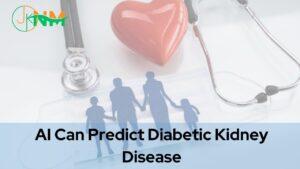AI Can Predict Diabetic Kidney Disease Early via Simple Blood Sample: The field of artificial intelligence (AI) has made significant strides in recent years, revolutionizing healthcare and showing tremendous potential in the early detection of various diseases. One such disease is diabetic kidney disease (DKD), a condition that affects a significant number of individuals worldwide. Through the utilization of AI and advanced machine learning techniques, healthcare professionals can now predict the onset of DKD early using a simple blood sample.
This article delves into the ways AI is transforming the diagnosis and treatment of DKD, offering hope for improved patient outcomes.
Understanding Diabetic Kidney Disease
Before exploring the role of AI, it is crucial to understand the basics of diabetic kidney disease. DKD is a common complication of diabetes and a leading cause of end-stage renal disease. Prolonged high blood sugar levels can damage the delicate blood vessels in the kidneys, impairing their ability to filter waste and fluids effectively. Individuals with diabetes, especially those with uncontrolled blood sugar levels, are at a higher risk of developing DKD.

Causes and Risk Factors
Several factors contribute to the development of DKD, including genetic predisposition, poor glycemic control, high blood pressure, smoking, and obesity. Additionally, individuals with a longer duration of diabetes are more susceptible to developing DKD. Identifying these causes and risk factors plays a crucial role in preventing the progression of the disease.
Symptoms and Diagnosis
DKD often progresses silently without presenting noticeable symptoms in the early stages. As the disease advances, individuals may experience symptoms such as swelling in the legs, foamy urine, fatigue, and high blood pressure. Timely diagnosis is essential for effective intervention and management of the disease. Diagnosis typically involves a series of tests, including urine analysis, blood tests, and imaging studies.
The Role of AI in Early Detection

Advancements in AI technology have opened up new possibilities for detecting diseases at an early stage. In the case of DKD, AI algorithms can analyze a patient's blood sample to predict the likelihood of developing the disease. This allows healthcare professionals to intervene and implement preventive measures before the disease progresses to an irreversible stage.
Advancements in AI Technology
AI technology has significantly improved in recent years, thanks to advancements in computational power and the availability of vast amounts of medical data. Machine learning algorithms can now be trained on extensive datasets, enabling them to recognize complex patterns and make accurate predictions. This has paved the way for the development of AI models capable of predicting DKD with high accuracy.
Read More : AI (Artificial Intelligence) – Impact on Social Life
Utilizing Machine Learning
Machine learning algorithms play a pivotal role in predicting DKD based on patient blood samples. These algorithms can analyze various biomarkers present in the blood, such as glucose levels, kidney function markers, and inflammatory markers. By feeding these data into a machine learning model, patterns and trends can be identified, allowing the algorithm to make predictions about the likelihood of DKD development.
Also Read :Robotic process automation (RPA) Vs Enterprise Automation Tool
Predicting Diabetic Kidney Disease
The process of predicting DKD involves analyzing blood samples using predictive algorithms. These algorithms are trained on a large dataset of patients with known DKD outcomes, enabling them to identify patterns and correlations between specific biomarkers and the development of the disease. By comparing an individual's blood sample to the patterns established by the algorithm, healthcare professionals can assess the risk of DKD and take appropriate action.
Analyzing Blood Samples
To predict DKD, AI algorithms analyze various biomarkers present in a patient's blood sample. These biomarkers provide valuable information about kidney function, inflammation, and glucose control. By examining the levels and patterns of these biomarkers, the algorithm can detect early signs of kidney damage and predict the likelihood of developing DKD.
Predictive Algorithms
Predictive algorithms play a critical role in DKD prediction. These algorithms utilize machine learning techniques to identify complex relationships between biomarkers and disease progression. By continuously learning from new data, these algorithms can refine their predictions and improve their accuracy over time. This iterative process allows healthcare professionals to make more informed decisions regarding patient care and intervention strategies.
Benefits of Early Detection
Early detection of DKD offers numerous benefits for both patients and healthcare systems. By identifying individuals at risk of developing DKD, healthcare professionals can implement timely interventions to slow or halt the progression of the disease. This can lead to improved treatment outcomes and a better quality of life for patients. Furthermore, early detection helps reduce the burden on healthcare systems by reducing the need for costly and intensive treatments associated with advanced DKD.
Improved Treatment Outcomes
Detecting DKD at an early stage allows healthcare professionals to implement targeted interventions to manage and slow the progression of the disease. This may include lifestyle modifications, blood pressure control, blood sugar management, and medication adjustments. By addressing these factors early on, the risk of complications and the need for dialysis or kidney transplantation can be significantly reduced.
Reducing Healthcare Costs
The economic burden of treating advanced DKD is substantial. By identifying and managing DKD at an early stage, healthcare systems can save significant costs associated with dialysis, transplantation, and hospitalizations. Additionally, early interventions aim to prevent or delay the development of other diabetes-related complications, further reducing healthcare expenses in the long run.
Overcoming Challenges
While AI-based DKD prediction shows promise, several challenges need to be addressed for its widespread implementation.
Data Privacy and Security

To utilize AI algorithms effectively, large volumes of patient data are required. However, ensuring the privacy and security of sensitive health information is crucial. Healthcare providers and AI developers must adhere to strict data protection protocols and maintain patient confidentiality throughout the data collection, storage, and analysis processes.
Ethical Considerations
AI in healthcare raises ethical considerations, particularly regarding consent, transparency, and bias. It is essential to establish clear guidelines and regulations to address these concerns and ensure the responsible and ethical use of AI technology. Balancing the potential benefits of AI with patient autonomy and privacy is paramount for its successful integration into healthcare systems.
Future Implications
The integration of AI into DKD prediction represents an exciting advancement in healthcare. As technology continues to evolve, AI algorithms are expected to become more accurate and efficient in predicting DKD. Additionally, ongoing research aims to identify new biomarkers and refine the predictive models, further enhancing early detection capabilities. Ultimately, the widespread adoption of AI-based DKD prediction has the potential to transform the diagnosis and management of the disease, leading to improved patient outcomes and more sustainable healthcare systems.
Conclusion
The application of AI in predicting diabetic kidney disease through simple blood samples has the potential to revolutionize the field of healthcare. By leveraging advanced machine learning algorithms, healthcare professionals can identify individuals at risk of developing DKD at an early stage, enabling timely interventions and improved treatment outcomes. The benefits of early detection include better disease management, reduced healthcare costs, and improved quality of life for patients. However, challenges related to data privacy, security, and ethical considerations must be addressed to ensure the responsible and effective use of AI technology. As technology continues to advance, the future implications of AI-based DKD prediction are promising, offering hope for early intervention and improved patient care.
Related Keywords :
- New AI Can Predict Diabetic Kidney Disease Early via Simple Blood Sample
- Advancement in AI Can Predict Diabetic Kidney Disease Early via Simple Blood Sample
- Health Advancement in AI Can Predict Diabetic Kidney Disease Early via Simple Blood Sample
- Health in AI Can Predict Diabetic Kidney Disease Early via Simple Blood Sample
- Health Disease Detection Method in AI Can Predict Diabetic Kidney Disease Early via Simple Blood Sample
- Disease Detection Method in AI Can Predict Diabetic Kidney Disease Early via Simple Blood Sample
- Diabetic Detection Method in AI Can Predict Diabetic Kidney Disease Early via Simple Blood Sample
- Diabetic Solutions using AI Can Predict Diabetic Kidney Disease Early via Simple Blood Sample
FAQs
Q1: Is diabetic kidney disease curable? A: Currently, there is no cure for diabetic kidney disease. However, with early detection and proper management, its progression can be slowed or halted, reducing the risk of complications.
Q2: How accurate are AI algorithms in predicting diabetic kidney disease? A: AI algorithms have shown high accuracy in predicting diabetic kidney disease based on blood samples. However, it is important to note that no prediction model is 100% accurate, and further research and validation are needed.
Q3: Can AI replace the role of healthcare professionals in diagnosing DKD? A: AI algorithms are valuable tools that assist healthcare professionals in making informed decisions. However, the expertise and judgment of healthcare professionals remain crucial in the diagnosis and treatment of diabetic kidney disease.
Q4: How can individuals reduce their risk of developing DKD? A: Individuals can reduce their risk of developing diabetic kidney disease by maintaining good blood sugar control, managing blood pressure, adopting a healthy lifestyle, and attending regular check-ups with their healthcare provider.
Q5: Where can I access AI-based DKD prediction services? A: AI-based DKD prediction services are typically provided by healthcare institutions and clinics. Consult with your healthcare provider to inquire about the availability of such services in your area.






